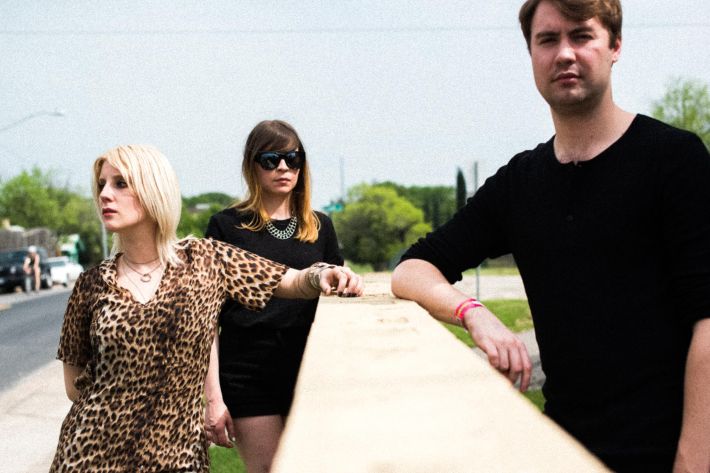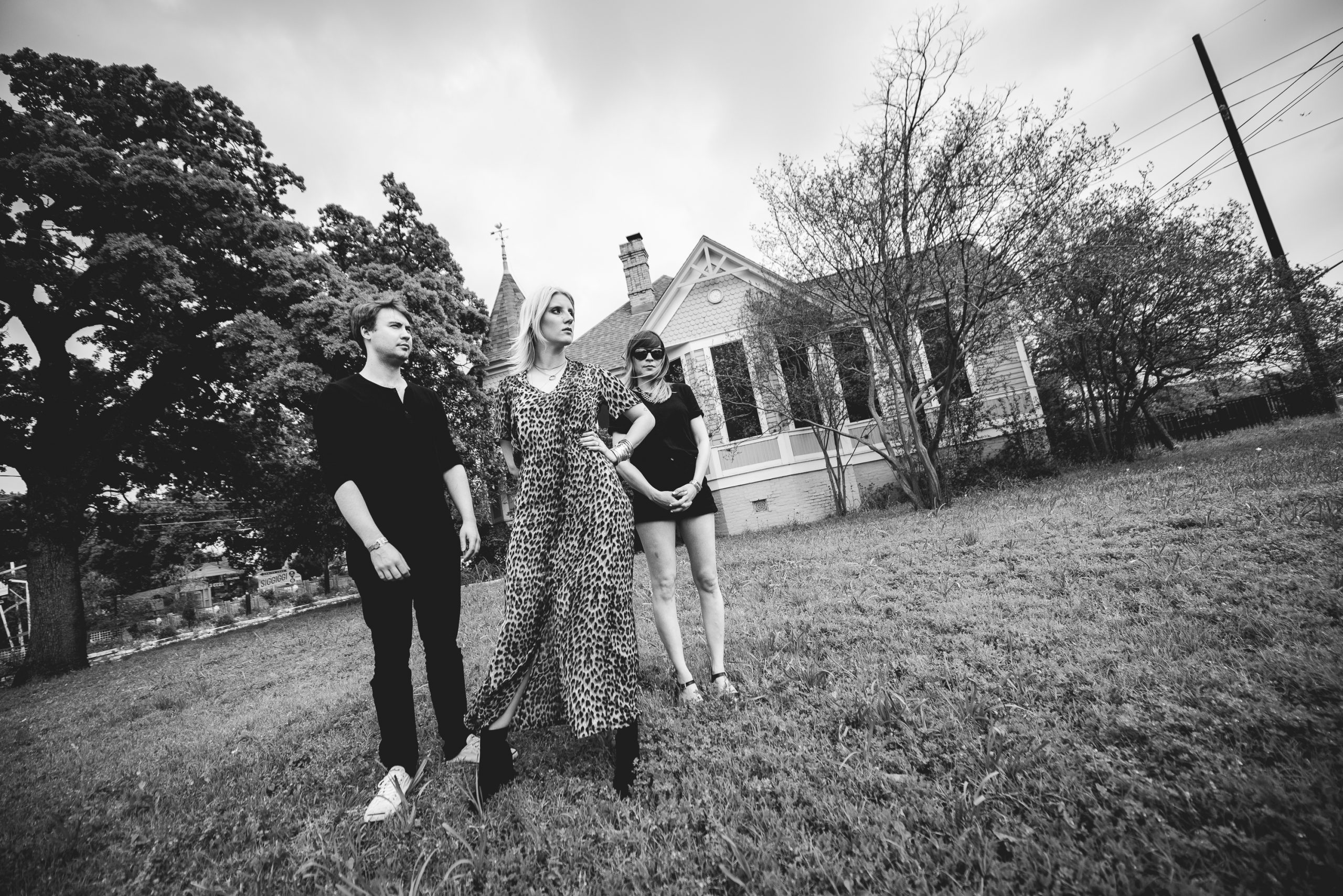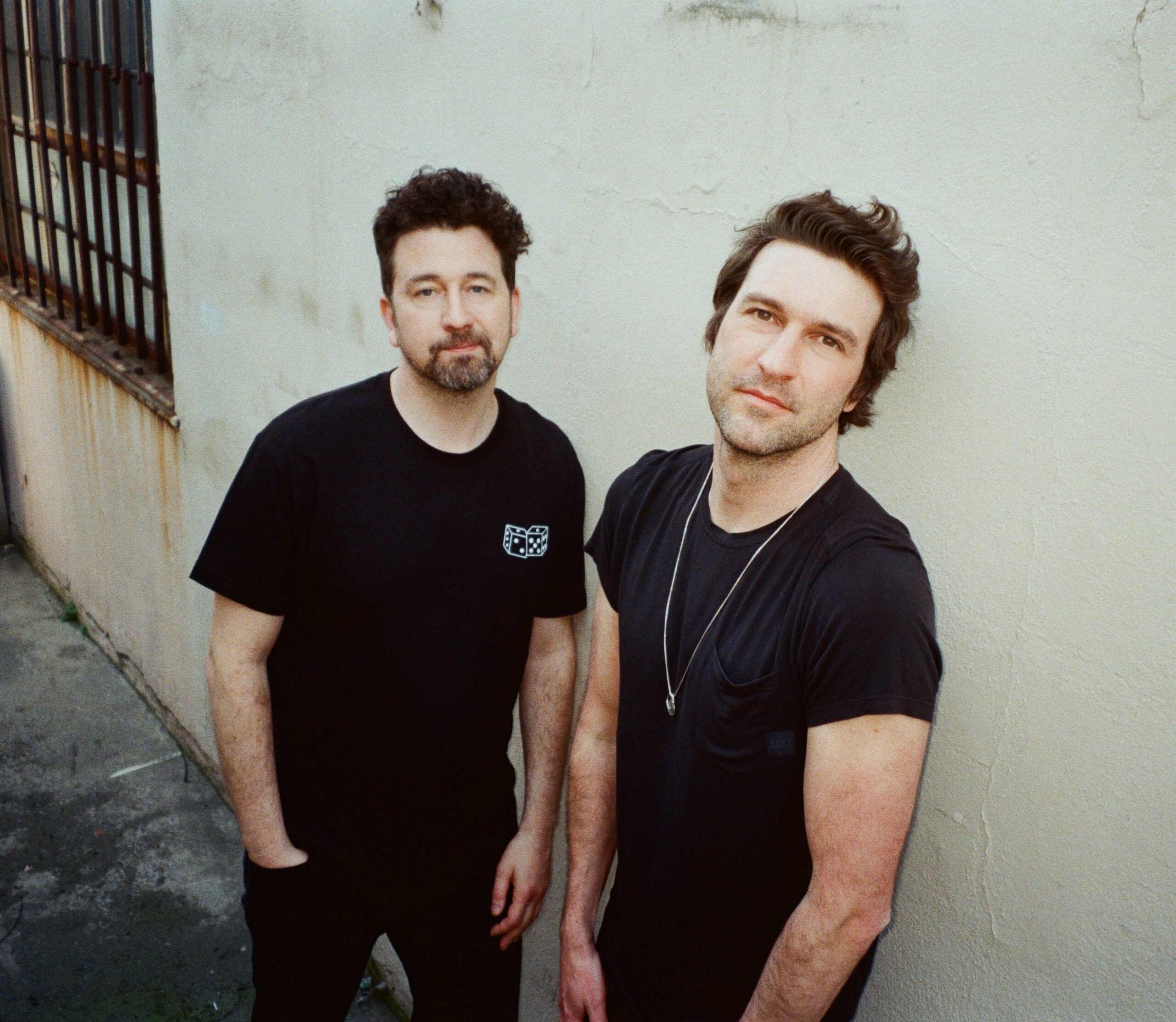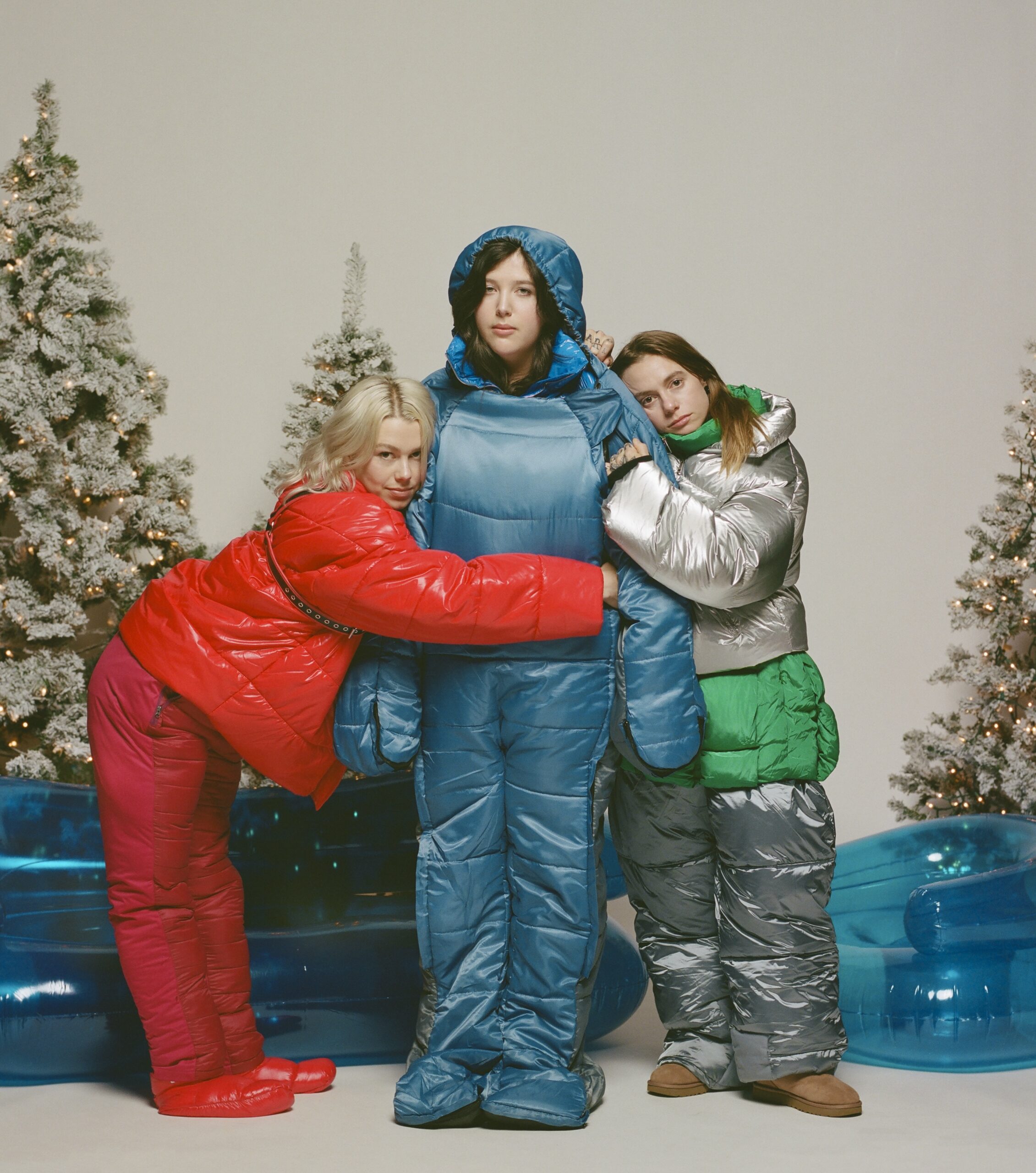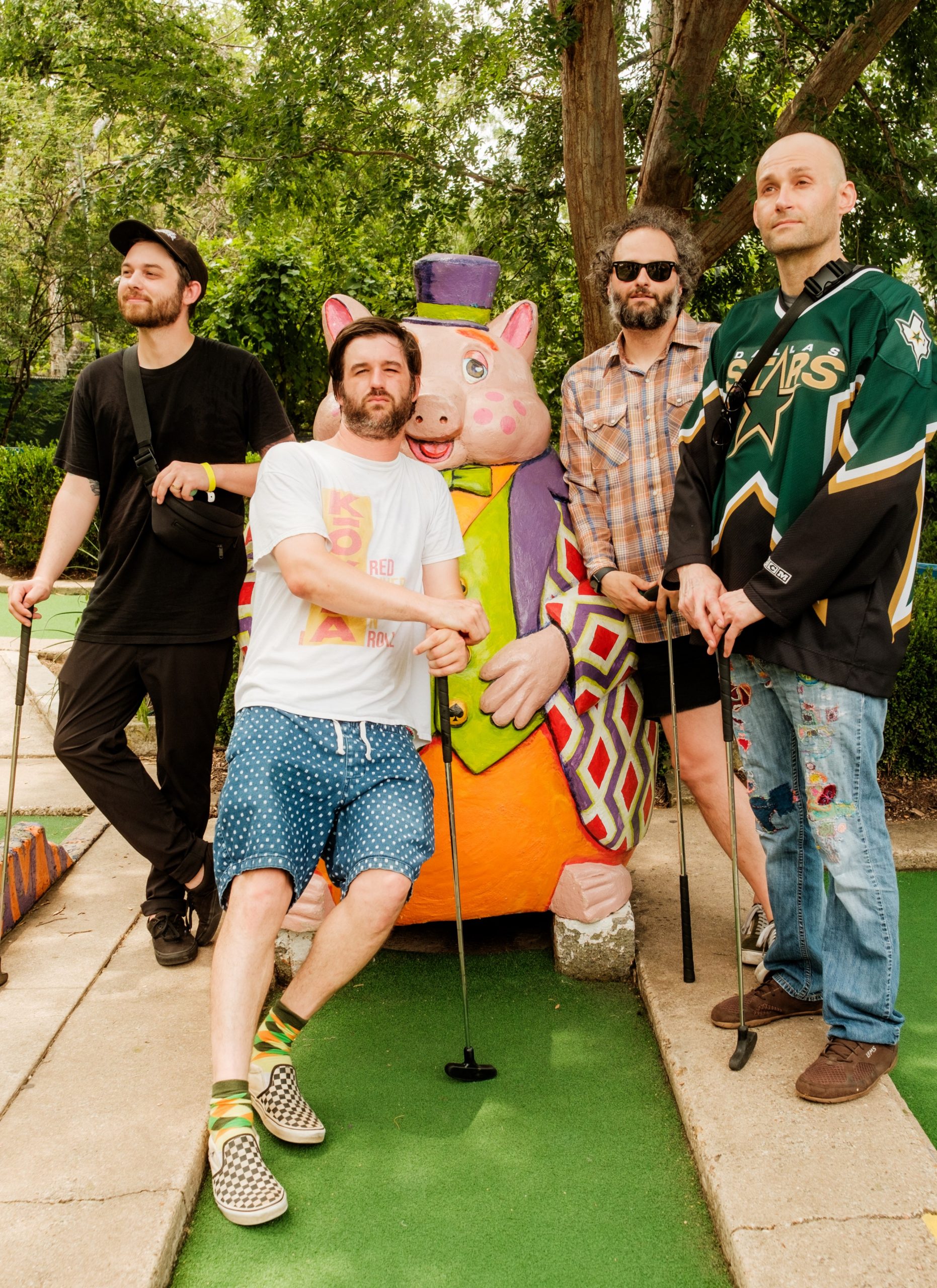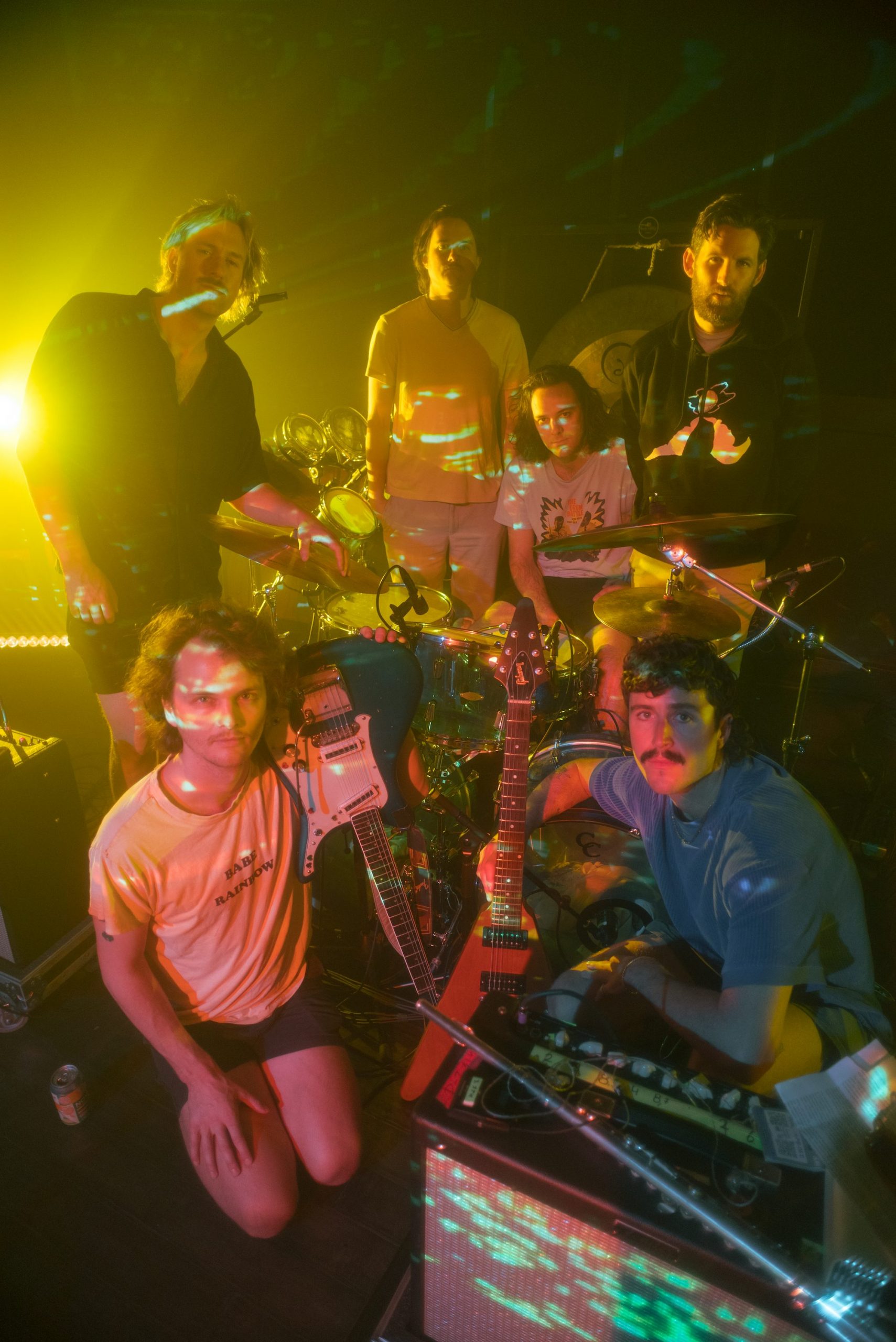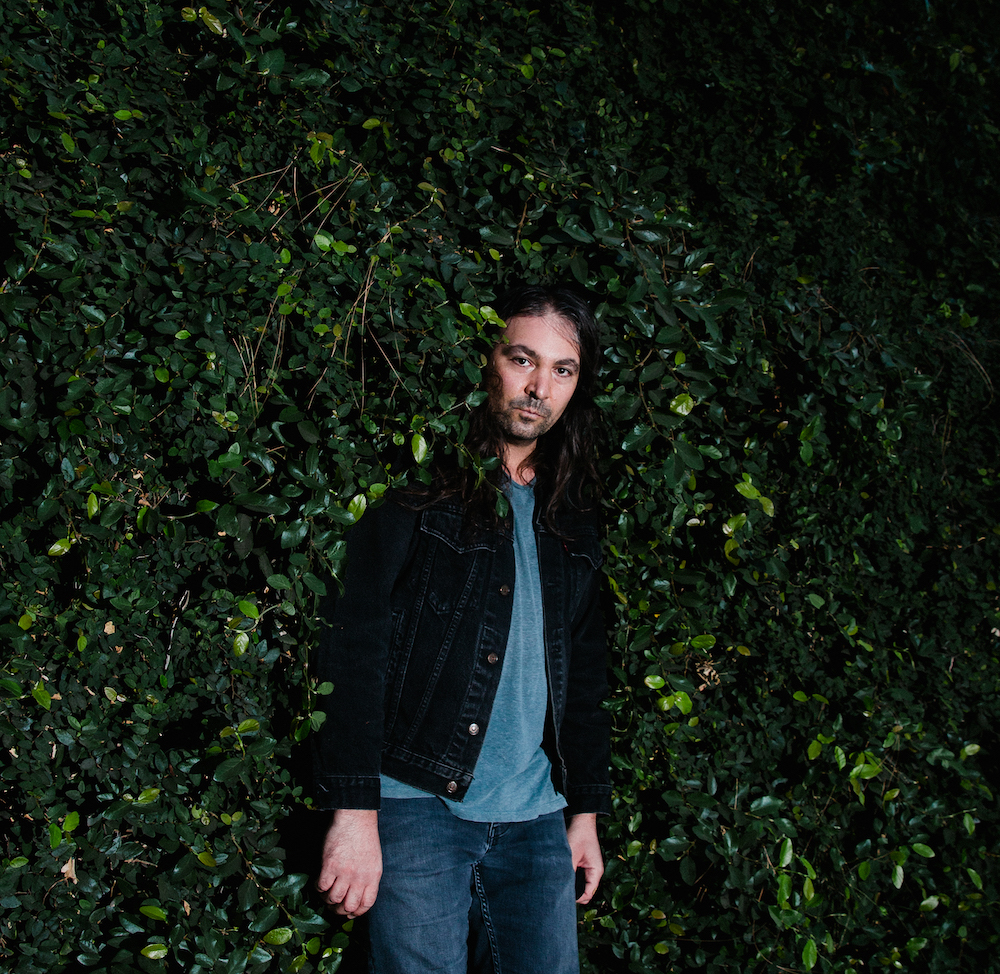White Lung's Ascension To Paradise
Austin, Texas is populated by a malicious blackbird called the great-tailed grackle. The birds make themselves known to visitors in two ways: Their very particular sing-song caw is inescapable, and they swoop down from the sky to scavenge whenever possible. There are food trucks and roadside restaurants all over East Austin, which to a grackle equate to a cornucopia of scraps to snack on and people to piss off. I’m sharing a table at one of those outdoor eateries with the members of White Lung when one massive grackle lands atop another and starts humping it. While the birds copulate, White Lung's frontwoman Mish Barber-Way’s facial expression evolves from revulsion to gleeful curiosity as she stands up and saunters over.
"THEY’RE FUCKING!" she shouts, and then sneers. White Lung’s guitarist Kenneth William laughs, and snaps a photo on his phone. The band’s drummer, Anne-Marie Vassiliou, lets out a short, sharp chortle, and looks on as Barber-Way continues to glare at the birds. "Oh my God," she says. "He’s got that look in his eyes!"
Before the fucking birds interrupt us, Barber-Way, William, Vassiliou, and I are talking about their new album, Paradise, on the first day of SXSW 2016. It’s White Lung’s second time playing the festival, and they’re only playing five shows as opposed to the 12 or so they did in 2013 before their last album, Deep Fantasy, came out. A lighter schedule isn’t the only thing that’s different this time around. Each of White Lung’s members has settled into life a bit more. They’ve traveled far beyond the familiar U.S. and Europe tour circuits, landing slots in Australia, New Zealand, and Japan. And, a little over a year ago, the woman formerly known as "Mish Way" became Mish Barber-Way. White Lung are in Texas in part to promote Paradise, the ambitious LP that finds the once-hardcore punk trio breaking into a new phase of their career. It’s their most arresting work to date, and one of the best albums of the year.
Right now, though, it might as well be 2013. White Lung are preparing for their first show of the festival, and Barber-Way, William, and Vassiliou quickly agree on a setlist. They played some of Paradise at a warm up show in Vancouver, and today they’ll debut the songs in front of an American audience. There’s no question that it will go smoothly, though, because as William tells me later: "One of the rules that we have in the band is that we don’t record stuff that we can’t perform."
Barber-Way is a bit frazzled, but not because of the show, or the grackle. Her long, chiffon leopard-print dress has torn in not one, not two, but three places, and she doesn’t have a change of clothes. The Texas heat is making her eye makeup melt and her hair flip up at the end.
"I look like the mom from the Brady Bunch!" she says to me jokingly as her voice pitches upward with put-on hysteria. Barber-Way later compares herself to a "proud mom" when she brags about the adventurous technicality of William’s songwriting on Paradise, and he laughs. She pries at Vassiliou to speak up more, and they exchange silent, knowing looks and snicker a bit when Vassiliou gives me a one-word answer.
The three members of White Lung complement each other in ways that burrow deeper than the resiliency of a friendship that can survive what Barber-Way refers to as the "squat touring" days of their youth. When they react to the fucking birds at the table next to us and then interact with one another, everyone fits comfortably into the roles they assigned each other a long time ago. As they discuss the unconventional, cut-and-paste creation of Paradise, it becomes increasingly obvious that this band wouldn’t function without each of its individual members. Barber-Way pointedly tells me that they trust one another, but she doesn’t have to say that. I can tell by the way her bandmates let her highlight their contributions, brag about them, that it’s true.
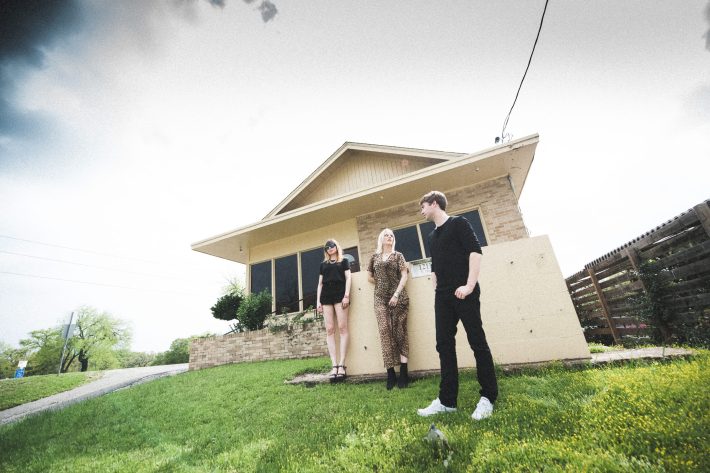
Vassiliou is quiet and rarely joins her bandmates for interviews. The most I come to learn about her during our lunch in Austin is that when she’s not on tour, she’s a receptionist for William’s childhood dentist. That, and the fact that she’s the reason White Lung exist in the first place. Barber-Way started this band in 2006 specifically because she wanted to make music with Vassiliou, who used to drum in the Vancouver punk trio the Riff Randells. Barber-Way was tired of playing in a then-boyfriend’s crappy punk band and she wanted to helm her own project. The original incarnation of White Lung featured Barber-Way, Vassiliou, bassist Grady Mackintosh, and guitarist Natasha Reich. The band put out singles, played shows, "fought all the time," according to Barber-Way, and then eventually, they met William.
[videoembed size="full_width" alignment="center"]https://youtube.com/watch?v=VTbiAuqewBA[/videoembed]
It was 2010. William was a familiar face; he was a younger kid who hung around in the same Vancouver punk scene and frequented underground warehouse spaces like the now-shuttered Emergency Room. William, who’s now 27, remembers knowing Barber-Way especially well from when she bartended at a pub that his high school band, Cheerleader Camp, would play on occasion. Everyone in the band was underage, and Barber-Way would sneak them drinks during shows. William initially asked to try out for White Lung over email, Vassiliou tells me, and smirks a bit when she remembers what it said: "I already know how to play all of your songs."
William assures us that he made it up, and Barber-Way doesn’t seem even remotely surprised. "Well, we only had six songs!" she retorts.
When recounting the history of White Lung, Barber-Way and Vassiliou don’t really reference the first four years that the band existed without William. Once he joined, the three of them -- along with Mackintosh, who left the band in 2013 -- recorded their debut album, It’s The Evil, which was released on the Canadian hardcore label Deranged Records. And that album is a hardcore album; it’s loud and furious and kinetic, with song titles like "Viva La Rat" and "Psychoholic." Only one track of the 11 clocks in at over three minutes. Two years later, they put out Sorry, the album that snuck its way across the Canadian border and made White Lung a known presence in the U.S. That album took them to Europe and across North America, but their 2014 Domino debut is what put them on festival bills and sent them off to tour beyond their usual circuit.
William describes Deep Fantasy as the second part to Sorry. Those songs are cathartic, frustrated onslaughts of sound, and lyrically, they navigate familiar terrain; conquering the quotidian problems that come with being a bored, broke, creative 20-something, finding power in apathy and vice. Both Sorry and Deep Fantasy were recorded in Vancouver alongside producer Jesse Gander, but writing the latter LP proved complicated once Barber-Way moved down the coast to Los Angeles. White Lung wrote the bulk of Deep Fantasy over email; William would formulate guitar and bass lines, Barber-Way would shape her lyrics around their melodies, and Vassiliou would create a drum part that mirrored both.
[videoembed size="full_width" alignment="center"]https://youtube.com/watch?v=BUIaj338JoE[/videoembed]
White Lung have always earned an exorbitant number of comparisons to ‘90s alternative rock bands. It’s hard not to lean on these references. Their music has always been noisy and brash, determinately punk and fronted by a woman with enviable presence. Barber-Way has bleached blonde hair and an unfuckwithable public persona that makes me want to pay money to watch her interact with Courtney Love. She’s cited Hole as one of her favorite bands in the past, and even wrote a piece on the impact Love’s "Bad Like Me" essay had on her as a teenager.
The comparisons don’t end there. In the six years that they’ve been touring seriously, White Lung developed a reputation for their uncompromising live sets. When Barber-Way performs, she moves her limbs like a battalion commander; one arm shoots up in the air to call an audience to attention, and later, an index finger extends to beckon them closer.
A good audience member, like a good soldier, stands rapt and at-attention. But there have been incidents when that wasn’t the case. In September 2014, a few months after Deep Fantasy’s release, video surfaced of Barber-Way fighting a male fan who had been heckling her from the front of the stage. She kicked him out, but not before throwing a few punches while screaming: "Get the fuck out of here! Don’t you dare lay a finger on me, motherfucker! Get out of here, motherfucker! Oh man, you know what? As a woman, I have fucked enough shitty dudes, I have paid my way. Fuck off! Fuck you!"
Barber-Way has always been a vocal advocate for women in punk. She wrote an essay for the Talkhouse about what it feels like to be the screaming, female member of a band in a male-dominated scene, and later she published one about how crippling it felt to lose that voice on a festival stage. It’s that same loud voice spouting uncompromising messages of resiliency that William attributes to the band’s earlier comparisons to riot grrrl -- a movement that, while rooted in punk and politics, never championed a band that could really aptly be compared to White Lung.
"I think [those comparisons] come from the way Mish sings," William says, laughing. "And maybe partially the way she acts."
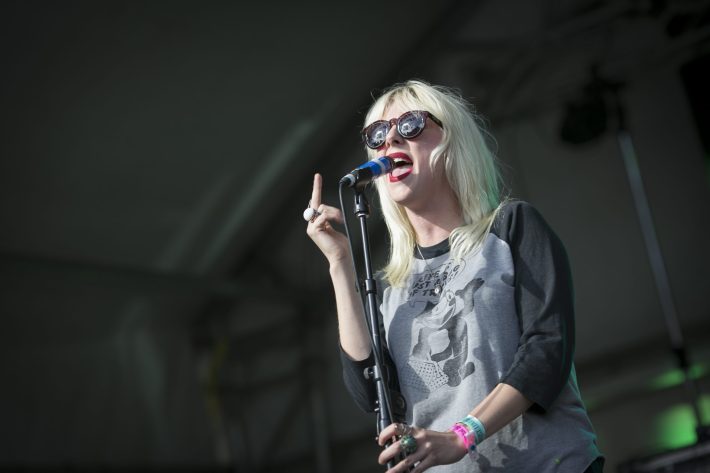
At this point in their career, White Lung are a band with an established narrative, one that they’re not necessarily trying to escape so much as subvert on Paradise. This is their fourth full-length, their second Domino release. It’s not necessarily supposed to be a breakout -- that triumphant title goes to Deep Fantasy -- but White Lung want it to be. Barber-Way and William both express some frustration over the preferred taglines surrounding Deep Fantasy.
"You know how it works," Barber-Way says, looking at me from across the table. "One article comes out and everyone logs the information from that and then recycles it. Once that starts happening, it’s really hard to break the cycle."
William nods and echoes her: "It’s kind of weird that it all gets turned into a story."
But to say an album doesn’t have a backstory leaves everything up to the imagination, and the fabrication of Paradise was nothing if not a meticulous process. After a brief stint in Montreal in the months after touring Deep Fantasy, William moved back to Vancouver. He and his bandmates had decided to record their next album in Barber-Way’s adopted home of LA. William sought out a new producer, going off of recommendations and his own research. The band ended up choosing Lars Stalfors (who has produced for HEALTH, Chelsea Wolfe, and the Mars Volta) for a fairly simple reason: He knew how to make things sound modern.
"That was our goal," William laughs. "Not to sound old."
When I press for why, the answer isn’t immediately obvious. The members of White Lung all mutually agree that it’s annoying, trying at times, to consistently be compared to ‘90s greats, especially at a time in rock music when everyone is being compared to ‘90s greats. But that reference is especially frustrating to William, who’s younger than both Barber-Way and Vassiliou, and grew up with an entirely different canon. He describes the "terrible techno" he used to make in high school, and references Crystal Castles as one of the most popular bands among the people he associated with growing up. William hadn’t played guitar for years when he asked to try out for White Lung; at the time he first befriended Barber-Way and Vassiliou, he was mostly messing around with synths and sequencers.
But something about White Lung’s attitude made William want to play guitar again.
"Mish and Anne-Marie’s personalities are so unique," he tells me. "I thought that we would actually be able to do something new and exciting together."
[videoembed size="full_width" alignment="center"]https://youtube.com/watch?v=SiXMm9gZl5s[/videoembed]
You can hear some of that early tendency toward synthetic sound on Paradise. William wrote each song on the album in a different key, which he claims isn’t as crazy-making as it sounds. William has a bottomless, wry sense of humor, but he gets kind of serious, scientific, when he’s talking about actually making music.
"It’s a bit harder to quantify," he pauses. "But every key does sort of have a different feeling to it."
That different feeling forces Barber-Way to sing differently, which keeps the music interesting, and keeps William busy. White Lung use a standard guitar-bass-drums setup, but many of the tracks on Paradise -- "Below," "Hungry," "I Beg You" -- use a MIDI pedal that loops separate guitar parts on and on into infinity, and have an effect similar to a synthesizer. White Lung’s earlier albums were claustrophobic and abrasive. On Paradise, there are wide stretches of arid, empty space; breathing room.
William’s last day job was on a film set for the forthcoming film Colossal that stars Anne Hathaway. The city of Vancouver -- with its modern city center and accompanying natural splendor -- is a film industry hub. William studied film in college, and he admits that if White Lung didn’t have a future, he would probably be working 18 hour days on film shoots, putting his education to use in the conventional sense. But William still composes with the mind of someone who used to score student films and grew up listening to movie soundtracks. Paradise is scaffolded by a series of moods and atmospheres. The most glaring example of this is "Vegas," a song with an instrumental breakdown worthy of the climactic murderous moments in a horror film.
When William tries to explain the intricacies and emotions behind individual sounds, his voice strains and he apologizes for being vague before he nails it: "I just make a stage for Mish to act on."
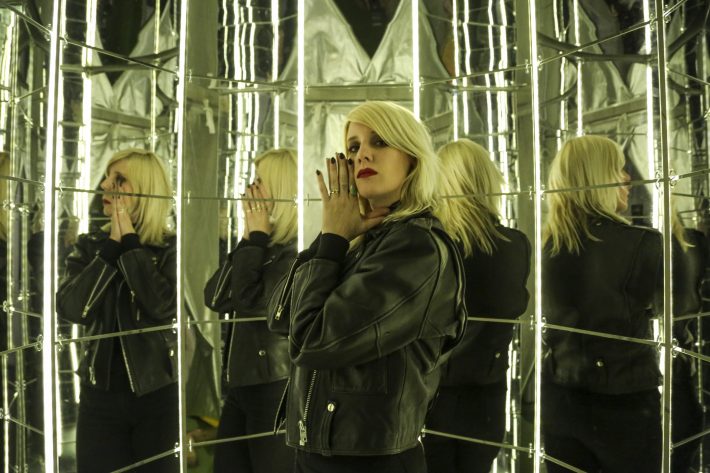
For a long time, the characters that joined Barber-Way on that stage were her own demons. Barber-Way was in her 20s when It’s The Evil, Sorry, and Deep Fantasy were released. On those albums, she sang about drug abuse ("Bag," "Drown With The Monster"), gender dynamics ("Down It Goes"), and body dysmorphia ("Take The Mirror"). And on those earlier albums, White Lung made sense of that internal chaos. Regardless of how anxious and frenetic the instrumentation on Deep Fantasy is, Vassiliou and William join her to create something bulletproof, anthemic. There isn’t any space on that full-length; in under half an hour it sucks you down into a dark, messy void and holds you under. But Barber-Way is 30 now, and Paradise is different.
Paradise’s lyrics were written on the opposite side of the emotional spectrum -- a happy one. There are love songs on this album; songs so passionately delivered that it’s not immediately obvious whether or not they’re confessions of devotion or indictments.
A few years ago, Mish then-Way met Austin Barber, a welder and bassist in the LA-based band Obliterations. They were introduced by Stephen McBean of the Vancouver band Black Mountain. After staying out until six in the morning, Barber asked Way to come home with him. She declined, but called a few minutes later. "Actually, can you come back and get me?"
Barber didn’t pick her up that morning, but their relationship evolved from there. The two would see one another now and again when Barber-Way would tour through LA, they took trips to the desert on Barber’s motorcycle. When Barber-Way finally decided to leave her lifelong home of Vancouver, an idea she’d been debating for a while, she chose LA over New York, knowing that the latter would make her miserable for two reasons: It’s cold in the winter and too far away from the band. She didn’t do it for Barber, even though she says he likes to think otherwise. "Remember when you moved here for me?" she mimics him in a taunting, loving rasp.
Barber-Way once wrote that she never envisioned herself having a big wedding -- too dependent on patriarchal values and therefore too stifling -- but her blunt definition of "true love" would appease any traditionalist.
"I’ve dated a lot of people and once we fell in love I was like: ‘Yeah, this is it. I don’t want to hang out with anyone else ever again. You’re the best. I’m willing to work through bullshit with you.’ And that’s kind of the thing, right? It’s very easy to fall in love with someone but it’s very hard to be willing to work through things with them when it’s not awesome."
Someday the couple plans on moving to the South, where Barber’s originally from, but for now they’re just looking to rent a bigger house in LA. One with enough space to fit all of their plants, taxidermy, furs, and dead stuff, Barber-Way explains. She shows me a photo of the ram’s head she recently acquired; it’s missing an eye, but Barber promised he would fix it for her soon. Between that portrait of domesticity and descriptions of some of the couple’s bike trips, their evenings spent hanging out at home, the two sound like sloppy kids who loved patiently and found marital bliss by accident. It wasn’t a cosmic boy-meets-girl fairytale. It took time.
But Happiness can be an unsettling place for an artist known for baring the intricacies of her personal life onstage and in print. Tortured Artist Syndrome is real, and it can be a hard thing to move past. So Barber-Way adopted new personae divorced of her own experiences to accompany her on the album. On Paradise, she writes from the perspective of a serial killer, a starry-eyed lover living in a trailer park, a fading beauty queen. Those characters don’t replace Barber-Way, they just support her leading role.
"I could have just written 10 love songs for my husband," she tells me, after admitting to feeling a bit tapped-out while writing Paradise’s lyrics. "I wanted to."
The second single off Paradise is "Kiss Me When I Bleed," and it’s one of the easiest to pinpoint as semi-autobiographical when Barber-Way sings: "They say I split my pride in two/ When I became a bride for you/ But what do they know?" Barber-Way already described that single as her fairytale, a rags-to-riches divination of theatrical, all-consuming love. It’s really the last song, the album’s title track, that’s most telling.
"Paradise" starts with the rapid-fire, hollow thud of Vassiliou’s kick-drum as Barber-Way delivers her words so earnestly that they almost sound menacing. "I’m all about you," she roars. "You’re all about me, too."

Barber-Way reminds me of the great-tailed grackle a few weeks later, while we look at a wall-sized infographic about various animal species’ mating rituals. We’re at the Museum Of Sex in Midtown Manhattan, a few weeks after first meeting in Austin. The grackle returned to us toward the end of that meal, his beady eyes staring down another potential mate. Barber-Way didn’t sit and watch -- she got up and chased him down.
"He’s just ready to roll with whatever girl bird," Barber-Way said. "I’m going to report him!"
When Barber-Way suddenly remembers the incident, she looks at me wide-eyed, contemplative. It was a telling moment, she decides, another example of the unending power play between the sexes, and predatory dynamics that she’s written about for years.
Outside of her work with White Lung, Barber-Way is a writer and journalist who specializes in sex and relationship advice. She’s never been to this museum, but Barber-Way is giving me a guided tour. We’ve already passed through the Hardcore: A Century And A Half Of Obscene Imagery exhibit, where Barber-Way narrates a bizarre silent porno cartoon in which a man’s penis detaches from his body and runs away from him. Barber-Way gives the escaped genitalia a Mickey Mouse voice. We talk about Linda Lovelace and bestiality and how the title of a pervy old book, Miss Fanny Hill, would be a good name for a stripper. As we both photograph the small pamphlet titled "Pussy Eating For Everybody," Barber-Way tells me about the men who sent indignant emails after she wrote a recent article on the subject for Broadly.
"Some of the emails were this long!" she tells me excitedly, measuring out two feet with her arms.
Barber-Way is the kind of person who has an anecdote for everything. Throughout the hours we spend together in New York, she brings up dozens of stories, relevant bits of conversational flotsam that acquiesce to form her character and the others that play supporting roles on Paradise. Barber-Way is currently obsessed with the survivalist TV show Naked & Afraid, and she can relate more than a few facts and figures in this exhibit on animal sex to bizarre interactions between its contestants. As we walk through an exhibit filled with "artifacts," Barber-Way traces various objects on display back to articles she’s published in the recent past. She tells me about the time she interviewed Larry Flynt and convinced him to assign her work at Hustler, as we walk past Hugh Hefner’s iconic smoking jacket.
This would surprise no one. Barber-Way’s brand of acerbic charisma extends far outside of the band’s confines. She’s been working as a journalist since she started writing for VICE Canada in her early 20s. Now she runs a weekly sex column for Vancouver’s Westender and regularly publishes investigative pieces on Broadly. One of last year’s articles, a piece about women who helped their husbands rape and murder other women, went on to inspire two songs on Paradise. On "Sister," Barber-Way sings from the perspective of Karla Homolka apologizing to her little sister, whom she killed. Another is an argument between the infamous, murderous British couple Fred and Rosemary West.
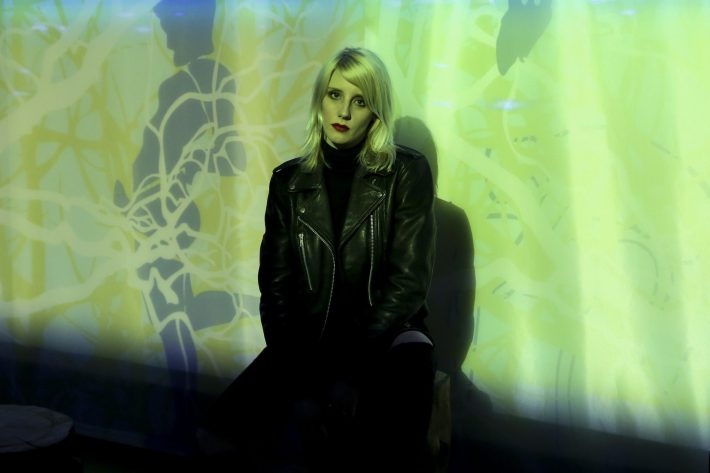
Talking to Barber-Way about her life outside of the band is easy -- namely because she has very few boundaries, and many of the ones she might still have are already broken down in detail throughout her career as a writer. When I ask if it’s OK for me to turn on my tape recorder in the museum, she says yes and waves her hand brazenly.
"If I fuck up, that’s my problem."
Barber-Way writes about her marriage, she reviews weed lube, sex toys, and relationship apps. All of the pieces she publishes impart bits of wisdom through a personal lens. Barber-Way -- who is the eldest of four children -- reminds me of a perpetually cool older sister.
But those fun reads don’t detract from some of the more serious revelations found throughout Way’s expansive collection of clips. She casually throws in a mention of recovering from morphine addiction when a girl wrote her asking how to overcome crippling body dysmorphia issues in a recent Sex With Mish column. She’s routinely written about her own body image issues, about how to deal with hating the ugliest parts of yourself. She’s written about working at a rape crisis center, the complexities of consent, the importance of speaking out against sexual assault. None of her personal anecdotes are self-indulgent or pitying; they’re just reminders that she has this job for a reason: She owned the baggage, the bullshit, and kept going.
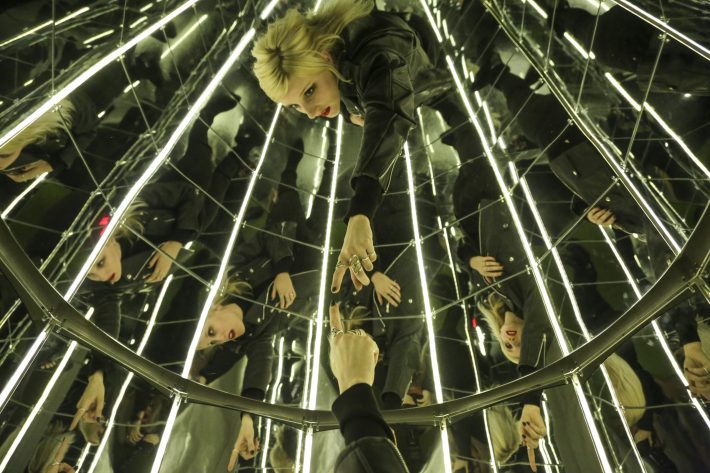
"Every new record should be the best work you’ve ever done." Barber-Way tells me matter-of-factly. "What’s the point if you’re going to make something shittier, right?"
There is a ballad on Paradise called "Below." It initiates with an almost hollow, crystalline guitar riff, echoed by a few steadily delivered notes. They’re melancholic, astral. The two accompanying parts curl around one another like layers of fog for half-a-minute before a cymbal swells and then crashes against Barber-Way’s voice as she delivers her opening line: "Part the tide/ Wash over mine/ Empty pride/ I’ll be fine when I go under."
When Barber-Way was a kid she was obsessed with mermaids. Her sketchbooks were filled with them. She doesn’t know why, but she remembers suddenly when we walk past a poster of one that hangs on the museum wall. There are references to water, to different types of drowning, throughout White Lung’s discography, but the inundation that happens on "Below" feels different. Barber-Way’s narrator submerges herself deliberately. She dives in, ready for whatever may come.
[videoembed size="full_width" alignment="center"]https://youtube.com/watch?v=60oHeAHe1Tc[/videoembed]
If Paradise’s intent can be defined by one moment, then this is it. "Below" is a song about how glamour wilts with age but doesn’t have to disappear. "A broken crystal carcass/ Reflects in all the light," Barber-Way sings. "I see it faded now and it’s so bright, so bright." It’s about transcending liminal time, about seeking the everlasting. It’s a beautiful song, a tender one, and it sounds like nothing White Lung have ever released.
When Barber-Way, William, and Vassiliou discuss "Below," they use words like "sparse" and "space." There’s nothing cluttering this song, it doesn’t pull you into a chokehold like some of the album’s others, it beckons you closer. It’s wide open, welcoming. The first time Barber-Way heard "Below," she thought to herself: I can do anything with this.
As Barber-Way sings, really sings its final line -- "We’ll go below where it’s so easy to not care" -- the two interlocking guitar parts fall out of step with one another. They shrink and contort into feedback that slowly fades to static, white noise. It's a loaded silence; an emptiness that echoes with possibility.
